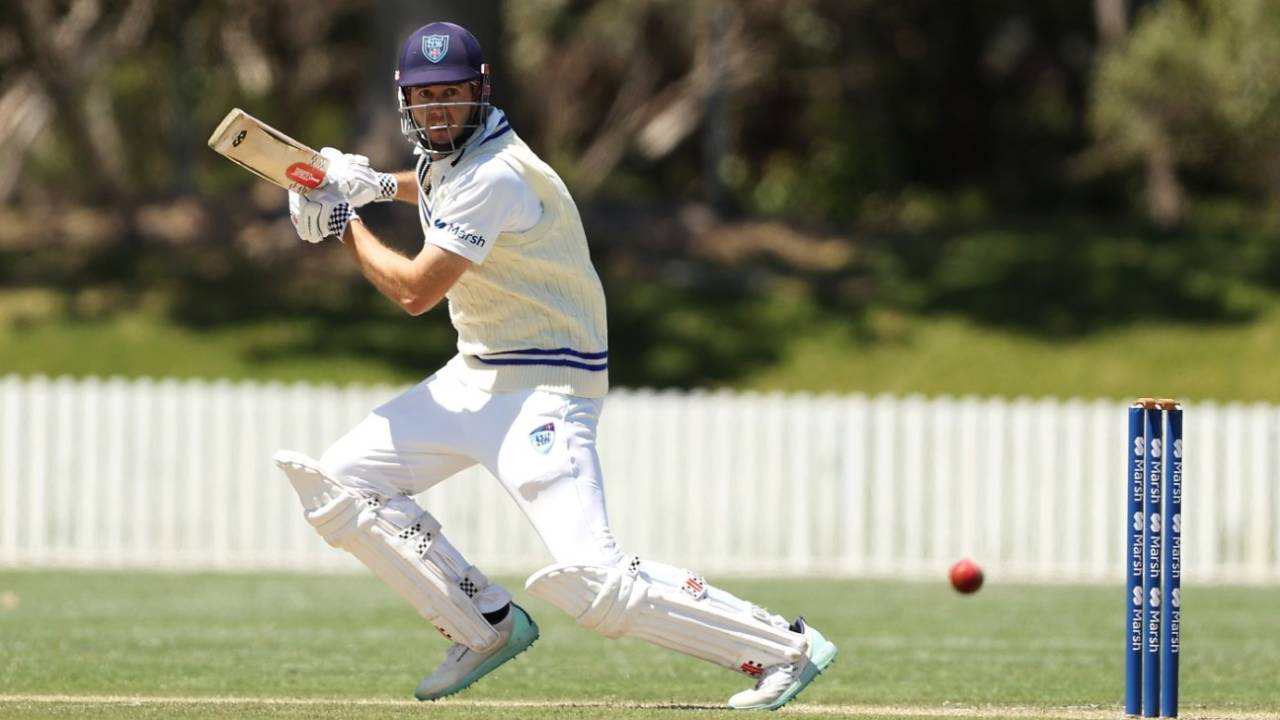Kurtis Patterson to be replaced as New South Wales Sheffield Shield captain
The left hander was dropped for the final game of last season and has had a lean time since his brief Test career
Andrew McGlashan
08-May-2023
Kurtis Patterson has struggled for runs in recent seasons • Getty Images
Kurtis Patterson will not be New South Wales Sheffield Shield captain next season with incoming coach Greg Shipperd hoping a return to the ranks will help revive his batting.
Patterson, who played two Tests for Australia in 2019, took on the NSW role ahead of the 2021-22 season when he replaced Peter Nevill. They finished fourth in the Shield that season before ending bottom last summer with Patterson dropped for the final match against South Australia.
Overall he averaged 29.78 last season with one century and scored just two hundreds during his time as captain.
Since his brief Test appearances, where he made a century in his second outing against Sri Lanka in Canberra, Patterson has struggled to make runs consistently with just three first-class hundreds in the next four seasons.
"That was a disappointing finish for the season for Kurtis," Shipperd said. "I've had contact with him today and we've identified some areas of his game and thinking. Losing the captaincy will allow him to concentrate fully on performing at his best.
"You can get consumed by captaincy and he gave it a terrific shot I've got to say while I was there, it was team first and him second. We can flip that balance around next season and make sure we get him back playing as well as he's ever played."
Moises Henriques stepped in as captain the final Shield game of last season but Shipperd said he and Greg Mail, NSW's head of performance, still needed to work through who would take the role permanently.
"That's a really important discussion to have," he said. "We do have some candidates that I think could comfortably do the job so it's about when I get up to Sydney next, sitting down with Greg and the team and those candidates and make sure we get the best decision out of it."
More broadly, Shipperd acknowledged it was the batting that really needed to lift for NSW although he had been encouraged by some late-season performances from younger players Ryan Hackney, Jack Edwards and Blake MacDonald - the latter earning his first contract. However, of those to play more than three matches, allrounder Chris Green topped the averages at 41.42.
"It's a complicated judgement when you are just looking at figures," Shipperd said. "I, like others, was a little bit alarmed that our younger batting group were tracking along in the mid-20s as averages.
"In my discussions with the players I was quite frank in terms of suggesting that success in first-class level is averaging above 40 with the capacity to have an out season and averaging over 60. So setting the bar quite high for those players and it was pleasing that four of them in response in the back end of the season averaged over 40, but that's just the start."
Shipperd also hoped that NSW would be able to play a greater proportion of their home Shield matches at the SCG so there was more of a home-ground feel to being in Sydney. The T20 World Cup last season restricted how much it could be used in the first half of the summer but for a number of years the team has regularly gone to suburban and intra-state grounds.
The players now have a permanent training base at the new Cricket Central facility which opened last season and there are plans for it to host top-level state matches. Following his retirement, Trent Copeland noted he had never had his own locker throughout his career.
"Essentially we have had no home ground, no training facility that is always our own," he told ESPNcricinfo. "That's now changed. Then we're playing one to three games at the SCG and then grade grounds and country grounds where we stand there at the toss and we have no idea essentially on how to build a game plan, what to do at the toss or even a best guess on what the pitch is going to play like, versus our opposition that are walking into the same venue every game. So these are a few of the little challenges that I think are going to start to be naturally fixed."
Andrew McGlashan is a deputy editor at ESPNcricinfo

